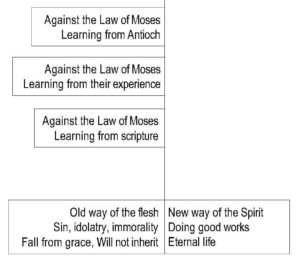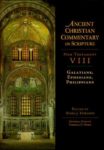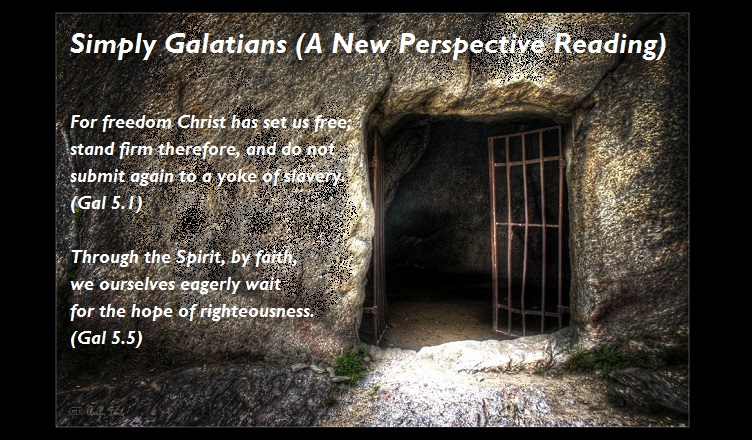From Galatians 6

The Early Perspective on Paul was that Spirit empowered works are necessary for the future judgment according to works. In this letter Paul continues speaking about the works of the flesh and the good works done in the Spirit, through which God’s people will receive eternal life.
This post is part of my Simply Galatians series.
Passage and Comments
As a reminder of the context, as mentioned in my Introduction, Paul has heard the Gentile Christians were again observing various festivals and sabbaths commanded in the law of Moses and were considering circumcision.
This behaviour leads Paul to question if they have now gone after another gospel. Which is why Paul has written this letter. To stop them living according to the law of Moses and live by faith in Christ.
I have highlighted in the First Post Paul and Peters common understanding of the gospel.

Paul and Peter both believed the gospel is the story of Jesus (life, death, resurrection, appearances and coming judgment) which declares him Lord and Christ. Their gospel is in accordance with the Old Testament promises and prophecies that anticipate Christ’s coming.
The Second Post considers the implications of this Gospel for Gentile believers.

The chief implication relevant to Galatians is that Jesus in the gospel has introduced a new covenant for the people of God. The law of Moses was given to the Jews and part of the old covenant era. Jesus has inaugurated the new covenant, and consequently a new way to live as God’s people (Jews and Gentiles).
The righteous now live through the Spirit, by faith and love. This means the righteous are not longer identified by their observance of the works of law, rather by faith in Christ. This includes believing Gentiles as part of the covenant people of God.
In this second post we saw Paul argue against observance of the law of Moses by describing his confrontation with Peter in Antioch where Peter gave the impression Gentiles had to observe the works of law and become Jews.

In the Third post Paul reminds the Gentiles in Galatia of their initial hearing of the gospel and experience of the Spirit and uses these to explain the ineffectiveness of the law of Moses to produce righteousness and life. Instead through faith and the Spirit they are to think of themselves as sons who have come of age and part of God’s worldwide redeemed family.
In the Fourth post we see Paul using several examples from scripture comparing and contrasting his ministry with the Judaizers. He wants the Galatian Gentiles to realise again who they are in Christ. They have been born according to the Spirit and are children of the promise.
In the Fifth post, Paul warns the Galatians those who have taken up the law of Moses again have been severed from Christ and fallen away from grace. As a result they have reverted back to the works of the flesh, which he has associated throughout this letter with the old age under the law. He urges them away from observance of the law of Moses and encourages them to love, do good and walk by the Spirit. Love fulfills all the law and is the primary fruit of the Spirit.
In this post Paul continues to encourage the Galatians to walk by the Spirit. However he doesn’t anticipate it will always be smooth sailing.
Gal 6.1-5

6 Brothers, if anyone is caught in any transgression, you who are spiritual should restore him in a spirit of gentleness. Keep watch on yourself, lest you too be tempted.
2 Bear one another’s burdens, and so fulfill the law of Christ. 3 For if anyone thinks he is something, when he is nothing, he deceives himself. 4 But let each one test his own work, and then his reason to boast will be in himself alone and not in his neighbor. 5 For each will have to bear his own load. (Gal 6.1-5)
‘Caught in transgression’. In the previous chapter Paul alluded the Galatians had been manifesting some of the works of the flesh (Gal 5.15,26). Here he gives some practical instructions with how the church ought to deal with sin in the community.
‘You who are spiritual’. He instructs the spiritually mature (1 Cor 2.6; 3.1) in the community to step in and gently restore the person to their former obedience.
‘Law of Christ’. Different from the law of Moses, the law of Christ (1 Cor 9.21) represents the commands and instructions Jesus gave his people in the gospel (Mt 28.20). Note, Paul considers himself under the law of Christ and this has none of the negative inferences he associates with being under the law of Moses.
‘Bear one anothers burdens’, ‘bear his own load’. Looking after one another in this way and in others is part of a an individual’s responsibility before God. However in doing so, Paul recognises people can succumb to pride and so he remind them they have to stand before God in the future judgment based on what they have done, not the deeds of others.
Gal 6.6
6 Let the one who is taught the word share all good things with the one who teaches. (Gal 6.6)
‘Share all good things’. A significant number of interpreters believe Paul is addressing financial gifts given to leaders in return for their ministry. For example Jerome (c.e. 347-420) says;

The meaning is this: Since previously he has been speaking to those who are spiritual about ethics … he now on the contrary speaks to those who are still rather weak, who are disciples yet live according to the flesh. Just as they reap spiritual gifts from their teacher, so they are called to give material gifts in return. …
It seems to me possible that this passage relates to an earlier statement, so that he is using the name “household of faith” to refer to teachers, who ought, as he says, to be supplied with all that is reckoned good by those who hear them. (Jerome, Epistle to the Galatians 3.6.6,10)
Gal 6.7-10
7 Do not be deceived: God is not mocked, for whatever one sows, that will he also reap.
8 For the one who sows to his own flesh will from the flesh reap corruption, but the one who sows to the Spirit will from the Spirit reap eternal life.
9 And let us not grow weary of doing good, for in due season we will reap, if we do not give up. 10 So then, as we have opportunity, let us do good to everyone, and especially to those who are of the household of faith. (Gal 6.7-10)
‘Sow’, ‘Reap’. Following on from his warnings and instructions about sin in the community, Paul describes the underlying principle for how they will be judged. They all will be judged according to their works. To deny this and keep on sinning is to court God’s wrath. (Contra. Schreiner, Galatians, who confusing the identification of the righteous with the future judgment according to works argues works are only evidentiary. See my page on future judgment and salvation where I have written on the topic extensively).
‘Corruption’, ‘eternal life’. Paul describes the consequences of the judgment.
Those who persist in sin will reap corruption, a term several associate with the uncleanliness that is associated with death (Acts 2.27,31; 13.34-6) and spiritual decay (2 Cor 7.2; Eph 4.22, 29; 2 Tim 3.8; 2 Pet 1.4; 2.19; Rev 19.2).
Remembering Paul wants them to depend on the Spirit for ethical guidance, rather than the law of Moses. Paul says those who sow to the Spirit will be raised from the dead by the Spirit (Rom 8.11) and therefore receive eternal life. This passage importantly highlights human responsibility in the process of salvation and connects the judgment according to works with future salvation showing the latter is dependant on the former.
We shall all be judged according to works and this plays its part in determining our eternal destinies.
‘Let us do good’. With this in mind Paul encourages the Galatians to do good and especially to those inside the church. If they do this Paul is confident they will reap eternal life.
John Chrysostom (c.e. 349–407) sums up the passage nicely;

The one who sows with his body luxury, drunkenness and insane desires will reap what comes from these. And what is that? Punishment, vengeance, shame, ridicule and destruction.… For as these things themselves perish they corrupt the body with them.
The fruits of the Spirit are not so but quite contrary. Consider now: If you sow merciful acts, heavenly habitations and eternal glory await you. If you sow love, a crown of honor waits for you—the blessings of angels and the athlete’s victory. (Homily on Galatians 6.7–8.)
Gal 6.11-17
11 See with what large letters I am writing to you with my own hand. 12 It is those who want to make a good showing in the flesh who would force you to be circumcised, and only in order that they may not be persecuted for the cross of Christ.
13 For even those who are circumcised do not themselves keep the law, but they desire to have you circumcised that they may boast in your flesh. 14 But far be it from me to boast except in the cross of our Lord Jesus Christ, by which the world has been crucified to me, and I to the world.
15 For neither circumcision counts for anything, nor uncircumcision, but a new creation.
16 And as for all who walk by this rule, peace and mercy be upon them, and upon the Israel of God. 17 From now on let no one cause me trouble, for I bear on my body the marks of Jesus. (Gal 6.11-17)
‘My own hand’. Paul dictates his letters and only occasionally signs off his letters with his own writing (cf. 1 Cor 16.21). Here he is keen to authenticate the letter as his. His large handwriting may be an indication of poor eyesight as some have speculated.
‘In order they may not be persecuted’. Paul infers that his Judaiser opponents do believe and preach about the cross of Christ. However they supplement their message with the command to be circumcised and adopt the works of law in order that they may not be persecuted by their Jewish peers. (Contra. Schreiner, Galatians, who does not think they mention the cross at all).
‘Boast in your flesh’, ‘boast in the cross’. If the Judaisers win them over to circumcision and works of law, then they will boast in their success. Religious parties often boast about their success in winning people over to their way of thinking.
Ambrosiaster (c.e. 366-384) says of this passage;

To please “in the flesh” means to please human beings. For those he calls false apostles, in order that they gain the approval of the Jews or at least not elicit their hostility, were preaching Christ in such a way that they also taught the necessity of observing the law. Paul was never intimidated by his opponents. He consistently refused to keep silent about the truth. He constantly was attentive to what he was teaching and how he was living. (Ambrosiaster, Epistle To The Galatians 6.11)
Paul however, boasts in Christ crucified. Which is completely counterintuitive, because the Jews believed the Christ was meant to be a victorious military leader, who would dominate the kingdoms of the world through military force. Jesus in contrast died on a cross. It was in this counterintuitive event however that Jesus did gain victory over the evil forces of this world and atone for our sins.
This is why Paul boasts in the cross, he sees God’s power in it.
‘New creation’. Twice in this letter Paul has said circumcision is irrelevant to God’s new economy (cf. Gal 5.6). For Paul, what counts is faith working through love and here he mentions new creation. He refers to people (cf. 2 Cor 5.17). Those who have come to faith in Christ are new creations (born again), part of God’s new world. This is what counts.
‘Israel of God’. Not all Israel is Israel. Circumcision does not incorporate people into the people of God. The Spirit does (1 Cor 12.12-14,27; Eph 2.13-22; 3.1-6). Its these new creation people, Jews and Gentiles who believe Jesus is the risen Christ who belong to the true Israel (cf. Rom 2.29; 9.6-8; Phil 3.3).
Gal 6.18
18 The grace of our Lord Jesus Christ be with your spirit, brothers. Amen. (Gal 6.18)
‘Grace’, ‘Brothers’. Paul ends his letter with a prayer and after all he has said is remarkably at peace. He calls them his brothers, knowing God is working in them just as He does in himself.
Words for Believers

The foundation for Christian behavior is the grace of God that awakens us, the love of God that stirs us to action, and the holiness of God that stiffens our resolve to obey him. And behind each of these is the fact that God will be our judge, that we will give account to him for everything done in the body, and that God is altogether honest and completely just. …
And Paul says that God will judge us on the basis of our life, whether it was “in the Spirit” or “in the flesh.” This means, that the final judgment, the judgment that will determine our entry into God’s blessing, is rooted in our works.
To be sure—and here I emphasize to the point of being pushy—the basis of our acceptance with God is what Christ has done on our behalf.
But for God to assess whether we are attached to Christ, he will simply scan the evidence of our lives: Is it one of living “in the Spirit” or of living “in the flesh”? Those who live “in the Spirit” do so by faith and obedience; those who live “in the flesh” have sins aplenty to show for their time on earth.
The judgment of God, then, is a motivational force for the Christian. Someday we shall stand, each of us, before God. That realization makes us different and changes our lives, or it ought to. (McKnight, S., 1995. Galatians, Grand Rapids, MI: Zondervan Publishing House.)
Copyright © Joshua Washington and thescripturesays, 2017. All Rights Reserved.





